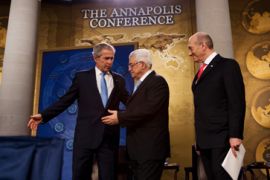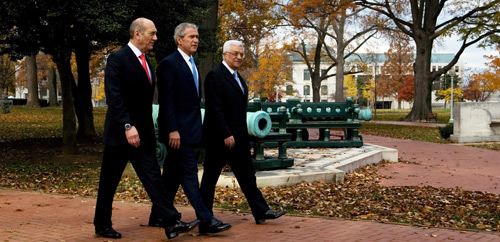Annapolis analyses
Al Jazeera correspondents put the statements of the three leaders in perspective.

 |
| Speech over, Bush left the nitty-gritty of negotiations to Olmert and Abbas [AFP] |
At the Annapolis conference, hosted by the US on Tuesday, Mahmoud Abbas, the Palestinian president, and Ehud Olmert, the Israeli prime minister, spoke about their committment to beginning a process in which they would resolve all outstanding issues by the end of 2008.
Abbas said that “all issues, including … refugees, borders, settlements, water and security and others,” must be discussed, and said that any peace deal between the Israelis and the Palestinians should ensure that Palestinians have East Jerusalem as their capital.
Olmert pledged to enter continuous negotiations with the Palestinians in an effort to complete an agreement by the end of 2008, but also said it was time to end “alienation toward the state of Israel”, adding that Israelis were “prepared to make a painful compromise, rife with risks in order to realise these [peace] aspirations.”
Marwan Bishara, Al Jazeera’s senior political analyst: “I’ve heard from three other gentlemen – President Clinton, Chairman Arafat as well as Prime Minister Rabin – the same speeches, exactly the same way, 14 years ago with, presumably, the very same determination.
David Chater, Al Jazeera’s correspondent in Jerusalem: “I think it’s the closest they could get to a joint declaration.
“In the end it was a statement read by President Bush which was merely there give the contours of final status negotations. The important thing is that some sort of negotiations were agreed. By the end of 2008, they’ll have some sort of agreement.
“There will be bi-weekly meetings, steering committees, intense negotiations. We are beginning to get some sort of detail about how the momentum will be developed.
“It’s all about Annapolis plus one. We’ve had photo opportunities, we’ve had the fine speeches, now we get down to the really hard work and those really hardcore issues.
“It was, in a way, a disappointment that the joint understanding was a feeble statement about how the negotations would go.
“Nevertheless, it was a strong speech by George Bush; a strong speech also by the Palestinian president. He said there’s been a paradigm shift, they are now at the crossroads; that it was a defining moment and that they must go forward; that they will not avoid any issue.”